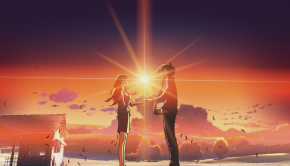George Oldziey Interview: Reflecting on Wing Commander and Ultima
Veteran game composer George Oldziey joined Origin in 1994 to score one of that year’s biggest games, Wing Commander III: Heart of the Tiger. Since then, Oldziey has has put his mark on some of the biggest computer games of the 1990s, including titles in the Wing Commander, Ultima, and Crusader series. After leaving Origin, Oldziey embarked on a freelance career that has seen him working on Red Faction: Guerrilla, a free-to-play MMORPG, and Robert Rodriguez’ movies, amongst others.
In this career-spanning interview, Oldziey reflects on how his involvement with Origin began and how he approached scoring several iconic franchises. He goes on to discuss how he carved a successful freelance career while exploring a wide range of media. He ends by revealing that he is releasing his first solo album, returning to his jazz roots.
Interview Credits
Interview Subject: George Oldziey
Interviewer: Simon Elchlepp
Editor: Simon Elchlepp
Coordination: Simon Elchlepp
Interview Content
Simon: George Oldziey, thanks for taking the time today to talk about your work. To start things off, could you give us some information about your musical background as a professional jazz musician? How did your move from New York to Austin affect your work, and was the focus at this stage of your career rather on performing or composing?
George Oldziey: I moved from NY to Austin to essentially kickstart my music career, which got derailed in NY. I was originally a professional trumpet player who played many styles of music, including jazz and classical. I had some minor nerve damage to my trumpet embouchure and had to take time off, during which I took up jazz piano. After much practice and study, I decided to make that my focus, which is what musically brought me to Austin at that time. I was not really composing much of anything when I first moved here.

Simon: Your first game scoring gig was Wing Commander III: Heart of the Tiger, a blockbuster title that at the time of its release was one of the most expensive video games to date. How did you land the job on the title? How familiar were you with video games or their music before starting work?
George Oldziey: I really had NO experience with video game music at the time of my hiring by EA/Origin to work on Wing Commander III. That was my first game score. I had recently completed my masters degree in music composition, but was mostly making a living playing and teaching piano. I’d run into a friend who had recently been hired by Origin, and he told me of a job opening there for a composer. I quickly put together a demo tape of various musical styles and they hired me a few weeks later. I had never even heard of Wing Commander, and had no idea what a big title it was until I was actually working on it.
Simon: Wing Commander III was designed to rival Hollywood sci-fi movies through its lengthy FMV/live action cutscenes that broke new ground in video gaming through the care and money that was spent upon them. How did this lavish visual presentation impact your brief for the title — was the aim to match it with an equally grand musical score? Given its aspirations to play like an interactive space opera, was your inspiration for the score movies like the Star Wars trilogy?
George Oldziey: Well, you have to admit that many aspects of the Wing Commander universe were modelled after Star Wars, so it was only natural to try to create a score as grand as that. But with the limitations of musical technology of the time, it was no easy feat! I of course emulated the idea of creating themes for various characters, places, situations, etc., the practice of which dates back centuries to early opera.
Simon: How difficult was it to adapt to the musical language of science fiction, or do you feel that your earlier composing studies gave you a ‘toolkit’ that you could apply to many genres, including large-scale sci-fi titles?
George Oldziey: I was most certainly familiar with the musical vocabulary of sci-fi, I’d just never worked on a commercial project of that genre before. I have to say that my best education in the art of scoring with an orchestral palette came from playing trumpet in orchestras in NYC. Most classical orchestral trumpet parts are a bit on the sparse side in terms of playing time, so you have quite an opportunity to listen to the rest of the orchestra from a great vantage point. I was able to absorb the sounds of how the masters utilized the instruments in the orchestra and tried to apply that to my scoring.

Simon: How did your approach change on Wing Commander IV: The Price of Freedom and Wing Commander: Prophecy? How do you feel did your music evolve over the course of these three games?
George Oldziey: Regarding Wing Commander IV, I think I did some of my best work for that game, even though it wasn’t quite as successful a commercial hit as WCIII. I’d just come off an entire year of composing for WCIII, and my “chops” as it were got fairly strong. I also had a much better sound library palette to choose from, so it was a lot more inspiring for me.
Wing Commander: Prophecy was the first WC game that Chris Roberts didn’t produce, and unfortunately the new producer wanted to, in my opinion, throw the baby out with the bathwater in terms of trying to create a fresh approach. That included me being told that anything that sounded reminiscent to the other WC games would not be accepted. I really felt, and lobbied pretty hard, about the fact that WC fans expected a particular sound that had become a signature style for the game. We did ultimately reach a compromise of sorts, but I didn’t really enjoy working on that game, and don’t think I created my best work for it.
Simon: Your music for Wing Commander III was MIDI-based, while the later Wing Commander games used streamed digital audio. Had you worked with MIDIs before WCIII and what were some of the technical challenges you faced on this game? In what ways did the move to digital audio later on make your work easier and more satisfying?
George Oldziey: Actually, the gameplay music for WCIII was indeed MIDI, but the cutscenes were all digital, so I had to work in both camps for that game.
What made the MIDI music challenging was the fact that the instruments would eventually play from whatever sound card the consumer had installed on their PC. The decision was made early on to score using the technology which at the time was top of the line for sound cards: the Roland Sound Canvas. But even that was challenging for creating a symphonic sound, because the polyphony was so limited that it was very easy to reach the limit and have notes drop out, so I had to be very judicious with my orchestrational choices.
For the cutscenes, I used a Kurzweil K2000 sampler, which was at least a bit of a step above the Sound Canvas in terms of sound quality. But the sound in the cutscenes played back at 22.05 kHz, 8 bit mono, so it was not exactly hi-res!

Simon: With the sheer amount of FMV/live action cutscenes in these three Wing Commander games, in how far did your music have to compete for memory space on the games’ CDs and did this ever impact your composition process? How did the cutscenes impact your work in terms of the quantity of music that was required, and in terms of scheduling — presumably you had to wait until the cutscenes had been shot to score them?
George Oldziey: There was never any restriction for the AMOUNT of music regarding computer resources, only the bandwidth at which it would play back, since the music was mixed with all the other sound elements for the cutscenes and all rendered together. The programmers had to figure out what we could get away with in that regard before sound design and music were created, but once that was settled, I was basically told to compose as much music for the cutscenes as I thought was necessary. I did indeed have to wait until the scenes were shot and edited before I could sync the music to picture, but I did work on creating themes and such beforehand, and in fact mostly drew from the gameplay music for musical ideas, since that was completed before I dove into the movies.
Simon: During your time at Origin, you also scored Crusader: No Regret and provided additional music for Wings of Glory. How did the sci-fi scenario in Crusader: No Regret and thus your musical approach to it differ from the Wing Commander games? On Wings of Glory, you collaborated with Laura Barrett and Nenad Vugrinec, who had scored several other Origin games. Can you recall for us the collaborative processes between Origin’s in-house composers during that time?
George Oldziey: The Crusader music, at least in my mind, had a more industrial approach than the Wing Commander music; less of that classic style. It was also a much smaller title in terms of size, so it didn’t take very long to finish. I didn’t really collaborate, as it were, with Laura or Neno very much, and in fact the only music I recall doing for Wings of Glory was the final credits, which was basically a jazz piano improvisation utilizing the chord progression of an old standard jazz song. Now I don’t even recall what that tune was!
Simon: Your last game for Origin was the long-awaited Ultima IX: Ascension. With this game, you stepped both into a new genre (fantasy) and into one of the most renowned and beloved RPG franchises. Was Ultima IX a daunting project to some degree, and how strongly was your work on the game influenced by previous Ultima scores? How did your music intimately complement the game’s lush visuals and what was it like to work with live musicians?
George Oldziey: I really enjoyed working on Ultima IX because it was a bit of a musical departure for me. It was much more laden with the old Renaissance and Medieval influences, both musically and instrumentally. I very much wanted to maintain the integrity of the earlier games, even though it was the first game I got to utilize live musicians and was able to explore a wider palette of sounds.
Since game budgets are usually finalized very early in the development process, we knew exactly what we had to work with in terms of hiring live musicians right from the start, so I composed all the music with that in mind. I of course first submitted MIDI demos to Richard Garriott for approval before creating the orchestrations for the live musicians. The ensembles ranged in size from just a handle of musicians up to about twenty wind, brass and string players.
The intimacy of the score had a lot to do with budget, as I originally wanted a full orchestra for at least some of the music. But the nature of the Ultima environments are really more suited for that more intimate approach anyway. The final result was basically a mixture of MIDI-based samples and live musicians.

Simon: Ultima IX had a very long development process that spanned several years. When did your involvement with the game begin, and how did its prolonged development process impact your work?
George Oldziey: I really didn’t start on that until about a year before its release, and it took about nine months to complete.
Simon: After Ultima IX, you left Origin to start your own company George Oldziey Music, Inc. What prompted this move and how challenging was it to move back into a freelancing career that included running your own company?
George Oldziey: In 1995, Electronic Arts had started laying off people company-wide in an effort to streamline production and make things more efficient. That trend continued in 1998, to the point where the last five remaining audio personnel (me included) were told that most of the audio content, and all of the music, was to be outsourced and that those who remained would mostly be utilized as content managers rather than creators.
I quickly decided that I wanted to be one of the contractors that Origin utilized, so an arrangement was made that they would lay me off and give me a generous severance settlement and the ability to purchase the gear I had in my studio. That enabled me to get off the ground right away on Ultima IX, my first title from the “outside”. The original plan was that I’d be guaranteed two such titles, but Origin was shut down by EA shortly thereafter. I really had no trouble transitioning back into the freelance world, since that’s where I’d spent most of my professional life before being hired by Origin.
Simon: Since founding George Oldziey Music, Inc., you’ve worked on a number of films, including several movies of director Robert Rodriguez, including Spy Kids 2, Spy Kids 3D, Sin City, andGrindhouse: Planet Terror. How did this collaboration begin? What is it about Rodriguez’ films, which range from B-movie homages to colourful kids movies, that intrigues you when you work on them?
George Oldziey: My association with Robert began rather simply in that he’d been given a copy of a demo I made upon my leaving Origin, and he just happened to be in the market for someone of my abilities at the time. I actually went through something of a trial process for the Spy Kids 2 gig, in which we put together a day-long orchestral scoring session where we recorded my arrangements of some of his songs. I did all the orchestrations, hired the orchestra and the recording company, as well as conducted the orchestra. He really liked the result, and that turned into a very nice run of several feature films on which I worked.

Simon: One of your biggest projects so far has been Shaiya, an MMORPG that you scored with an 80-piece orchestra and a 20-voice choir. Interestingly, Shaiya is also a free online game, a genre which rarely receives such lavish scores. How did this orchestral score come about and did you enjoy the opportunity to write for such a large ensemble?
George Oldziey: Working on that score was some of the most fun I’ve ever had in the industry. It began innocuously enough when the audio director for the game contacted me by email from South Korea and asked me if I’d be interested in scoring the game. He already had approval for hiring a full orchestra and a choir and just needed my bid for my services. It was unusual, and seemed like a dream come true. In addition, they really wanted to record the score in Hollywood in order to use that fact in their publicity for the game. Sitting in the booth at Warner Brothers and hearing that sound coming from the monitors for the first time is a moment I’ll never forget! What great musicians!
Simon: MMORPGs, with the immense amount of time that players spend in their worlds, pose particular challenges in regards to how much attention their music should attract, or not ,so that the score doesn’t feel repetitive. How did you tackle that challenge with a full-bodied orchestral score?
George Oldziey: I’m actually not completely sure how the Shaiya music was utilized in the game, but they did give me a very detailed cue list with exact lengths of the pieces, which ones should loop, and included examples of temp music that they wanted me to emulate to some extent. So their direction was very precise, and I basically created the score within the parameters they had already set forth.
Simon: One of your latest high-profile game projects was Red Faction: Guerrilla, a soundtrack that was a collaboration between five different composers, including Tim Wynn and Jake Kaufman. You worked with Dan Wentz on a number of compositions — how closely did you two collaborate? The score showed a side to your talents that gamers hadn’t been exposed to much before: electronic, semi-ambient pieces that developed a gritty, dark atmosphere. Was this a new genre for you or had you worked with such stylings on other projects?
George Oldziey: I was contacted to work on Red Faction: Guerrilla, because they really liked the work I did on Grindhouse: Planet Terror. Basically, my work for that game was to create about 60 minutes of music in that style, with some pieces utilizing themes originally composed by Dan for the earlier Red Faction games, as well as others composed totally from scratch. I didn’t collaborate with the other composers, but Dan and I stayed constantly in touch so that I could stay true to his original intent while I explored new sounds and musical textures. I really enjoyed working on that project.

As I mentioned, the sound was inspired by my work on Planet Terror, but in RFG I had the opportunity to REALLY explore that genre, which was a bit new to me. I’ve always felt that the line between musical scoring and sound design is very hazy, especially in more contemporary scores, so I always welcome the challenge and opportunity that comes with expanding one’s musical vocabulary. I think all music is relevant, and a good composer should be able to create hybrids of a vast variety of styles if necessary.
Simon: Many thanks for your time today, George Oldziey. Is there anything else you’d like to say about your work in general and do you have any messages to readers from around the world?
George Oldziey: I just want to thank you for the opportunity to answer your questions, and am thankful that after all these years, game fans still remember me and appreciate my music. I’ve been blessed in that I’ve had the opportunity to work on some great game and film projects. Hopefully those opportunities will continue well into the future!
On another musical note, after decades of composing for other people, I’m finally releasing a CD of all original Latin/Jazz music under my own name! The band is called GATO 6 (GATO being my initials; George Alan Thaddeus Oldziey) and will be released on my own record label, Bus Biscuit Records. The CD is entitled El Viento and will be officially released August 23rd. So keep an eye out for it on iTunes, Amazon, CDBaby and a host of other sources! You can hear some samples here.
Posted on August 15, 2012 by Simon Elchlepp. Last modified on February 27, 2014.














